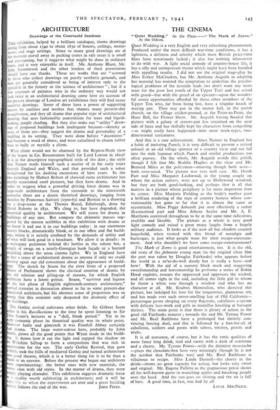THE CINEMA
I, Quiet Wedding." At the Plaza.----" The Mark of Zorro." At the Odeon.
Quiet Wedding is a very English and very refreshing phenomenon. Produced under the most difficult war-time conditions, it has a lightness, a deftness and celerity which most British peace-time films have notoriously lacked ; it also has nothing whatsoever to do with war. A light social comedy of country-house life, it has a silly and unimportant theme which might have been handled with appalling results. I did not see the original stage-play by Miss Esther McCracken, but Mr. Anthony Asquith in adapting her material has resisted the temptation to underline the psycho- logical problems of the juvenile leads (we don't want any more tears for the poor lost youth. of the Upper Ten) and has seized with greed—but with the greed of an epicure—upon the wonder- ful comic opportunities afforded by those other members of the Upper Ten who, far from being lost, have a singular knack of staying put. They stay put in the manor hall, in the parish church, on the village cricket-ground, at the Point-to-Point, the Hunt Ball, the Flower Show. Mr. Asquith having flooded this picture with a galaxy of stayers-put has remained on the near side of farce and has skilfully kept his characters from congealing —as might easily have happened—into mere stock-types, two- dimensional caricatures.
And this is a rare achievement. Since Nature in England has a habit of imitating Punch, it is very difficult to present a retired colonel or an old village spinster or a country vicar and not fall into the stale humour which Punch and similar productions too often purvey. On the whole, Mr. Asquith avoids this pitfall, though I felt that Mr. Roddie Hughes as the vicar and Mr. Bernard Miles as the policeman—amusing though both were— both over-acted. The picture was very well cast. Mr. Derek Farr and Miss Margaret Lockwood, as the young couple on whom the action centres, were not up to Hollywood standard, but they are both good-looking, and perhaps that is all that matters in a picture whose periphery is far more important than its centre. Miss Marjorie Fielding as the bride's mother gave a brilliant rendering of the type of country hostess whose con- ventionality has gone so far that it is almost the same as eccentricity. Miss Peggy Ashcroft put over effectively a rather ill-conceived part and Miss Athene Seyler and Mr. A. E. Matthews contrived throughout to be at the same time ridiculous, credible and likeable. The picture as a whole is very good light comedy and raised a great many laughs from a largely military audience. It looks as if the now all but obsolete country household, when treated with this blend of nostalgia and burlesque, is just what people want for their escape-entertain- ment. And why shouldn't we have some escape-entertainment?
The Mark of Zorro is good entertainment, too. It is the old, old story of the debonair young man (in the original silent film the part was taken by Douglas Fairbanks) who appears before the world as a ne'er-do-well dandy but is really a hero—and how! With the aid of a nursery black mask and staggering swordsmanship and horsemanship he performs a series of Robin Hood exploits, rescues the oppressed and oppresses the wicked, and all comes right in the end, including the little girl to whom he threw a white rose through a window and who has no character at all. Mr. Rouben Mamoulian, who directed this picture, has indulged his love for the languorous, glamorous set, and has made ever such sweet-smelling hay of Old California— picturesque peons sleeping on every flagstone, caballeros a-sprout with delicate lace-work and girls in mantillas kneeling at baroque shrines. The main point is that there is plenty of action in the good old Fairbanks manner ; towards the end Mr. Tyrone Power and Mr. Basil Rathbone have a prolonged but entirely con- vincing fencing duel, and this is followed by a free-for-all of caballeros, soldiers and peons with sabres, torches, pistols and sticks.
It is all nonsense, of course, but it has the tonic qualities of some fancy long drink, iced and exotic with a dash of cointreau and a cherry. Mr. Tyrone Power—with the daintiest moustache —plays the chocolate-box hero very winningly (though he is not the acrobat that Fairbanks was) and Mr. Basil Rathbone is villainous to recipe. Miss Linda Darnell—the cherry in the drink—shows no great capacity for acting, but looks very sweet and virginal. Mr. Eugene Pallette as the pugnacious priest shows all his well-known gusto in munching apples and knocking people over the head. And the sun goes on shining and the air is full of hats. A good time, in fact, was had by all.
LOUIS MACNEICE.






























 Previous page
Previous page